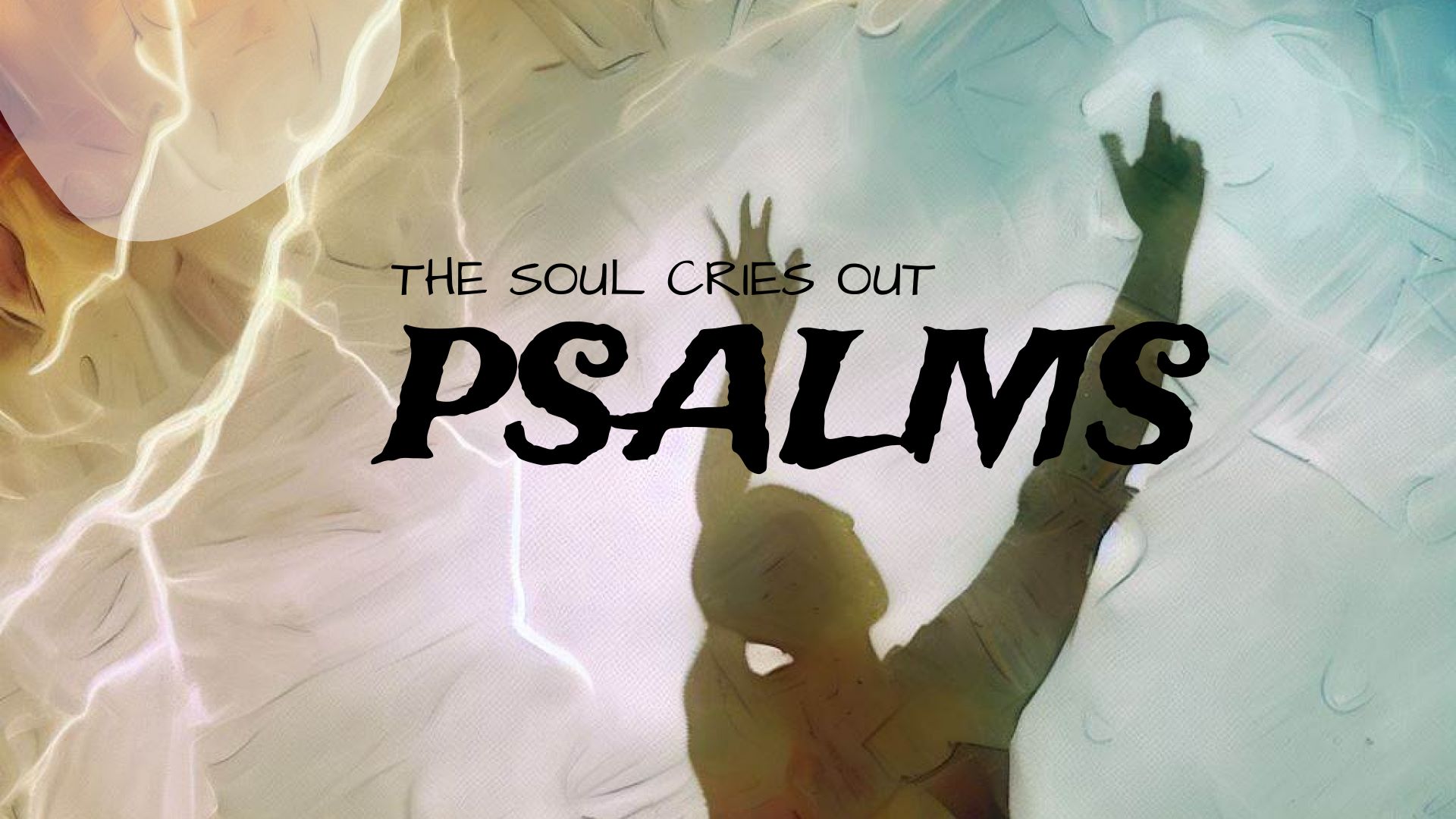11 Cries of the soul from the book of Psalms
The writer Christian Wiman artistically captures one of the central dynamics of the book of Psalms, saying:
“Abundance and destitution are two facets of the one face of God, and to be spiritually alive in the fullest sense is to recall one when we are standing squarely in the midst of the other.”
My Bright Abyss: Meditation of a Modern Believer, 112
Journeying through the book of Psalms brings you through (1) seasons where everything is well in the world, (2) seasons where nothing is well, and (3) the time of emerging from seasons of distress into new seasons of joy. One reason why Psalms is so powerful is that not only does it speak to the seasons of life, but it speaks through them as well. That is, it teaches our souls how to cry out to God in all of life. Psalms emerges from the place of God’s people wrestling to know God and the result is more than just a bunch of poems. The psalms give a voice to the heart and teach the soul how to sing.
The journey
Our 11 weeks in the book of Psalms takes us only through a small portion of the wealth of the 150 different psalms found there.
But these 11 psalms capture some of the key ways that Psalms aims to shape our souls. And that is really important. Psalms is not in the Bible just to be neat poetry; rather, it is there to shape our souls so that they walk with and cry to God in tune with him.
Here are 11 ways your soul should cry out to God:
- Psalms 1-2: sing the song of blessed submission as you learn blessedness through submission to Torah (God’s word) and Messiah (God’s Anointed rescuer and ruler)
- Psalm 8: cry out God’s majesty as a director of the world in praising God
- Psalm 145: cry out with thankfulness for God’s robust and complex goodness in this world
- Psalm 86: praise God in the midst of the storms of life
- Psalm 88: learn to lament (it is worship, too)
- Psalm 79: cry out against brokenness with passion for God’s saving and judging acts
- Psalm 109: cry out in your anger toward God to find the stability and peace to speak in love towards your neighbor
- Psalm 23: praise God for the settled peace of being his—in the darkest valley or at the exalted banquet table
- Psalm 117: cry out the praises of God with such brilliance that others see his steadfast love is beautiful
- Psalm 136: worship God for the simple and life-alter reality: his enduring love is the greatest thing EVER
- Psalm 150: cry out to God because “Praise God” is the point of life
Leaving the Psalms
This brief sermon series in the book of Psalms barely touches at the riches therein. There is much more to learn.
Crying comes naturally to a baby. The baby feels a need and cries out over it. Crying at this basic, instinctual level is useful. But it is a crude and limited form of communication. As the baby grows up, crying in this instinctual way becomes more and more a limitation rather than a help. The child needs a more robust way of communicating the needs and desires of the soul.
In a similar way, crying out to God comes naturally to his children. But our instinctual cries stand in need of honing, shaping, and maturing as we come to better know God, his intentions, and this world he has created. Mine the Psalms. Meditate on the Psalms. More so than any other place in Scripture, here your soul is schooled in crying out to God in all of life.
Check out guidance here from Dr. Donald Whitney on praying the psalms and praying the Bible. This is life-changing guidance on prayer!
Shape it well through long years of steady observance and practice.
June 18, 2023 Church Service
Adversaries and anger
In Psalm 79 and 109 we see the psalmist crying out in anger against adversaries. Parts of each of these psalms sound pretty harsh. But they do address an important part of life: the reality of adversaries. We all have adversaries of some sort at points in our lives. The book of Psalms, wonderful for so many reasons, gives us guidance on how our hearts should move towards God and others when we are angry because of difficult people and difficult situations in life.
Responding to adversaries in difficulty
Adversaries come in many shapes and sizes. We can consider people bringing difficulties into life as “adversaries.” Maybe, like the psalmists, your adversaries are people scheming about how to kill you. More likely, they are people plotting your downfall at work, a family member who always manages to create chaos whenever they show up, a class bully, or a medical provider who doesn’t take you seriously. The list of possible adversaries is nearly endless. They all share in common the ability to elicit anger as they bring difficulties into life.
There are many ways we can respond to difficult people and difficult situations in life. Here are four ways we can respond to adversaries and the anger they inspire in life: (1) dreaming, (2) scheming, (3) bearing, and (4) moving.
dreaming
By dreaming I mean the sort of wishful hoping for the downfall of your adversary. Maybe you silently wish your coworker would get fired; or that your obnoxious neighbor will get caught violating the city rules and be forced to change their ways. Whatever it be, dreaming involves a sort of curse: “I hope you choke.”
scheming
If dreaming is wishing for the downfall of your adversary, scheming takes it one step further. Here you are actively planning how to bring about the shame and/or downfall of those who have hurt you.
Scheming may take the form of passing around juicy stories—whether true or false—with the aim of exposing your adversary to ridicule. Or, in a more extreme form, scheming can involve creating traps that directly threaten the life and well-being of an adversary: political, financial, relational.
Scheming can feel good because it is taking initiative and using our power to fix the situation.
bearing
Often, the adversaries of our lives will pass by, if we are content to wait for a time. And if you are prone towards stubbornness, waiting emerges as an obvious approach to conflict. Bearing allows you to deal with your adversaries by not dealing with them. You may bear with your adversaries and the anger and frustration they bring into life because you are strong and can take it; you may bear with them because you feel like you deserve the difficulties they bring into your life. Whatever the reason, bearing concludes that it is better to put up with injustice than to try to do anything about it.
moving
Another possible response to adversaries is to move. That is, moving towards God. Moving involves turning toward God in prayer about our adversaries, driven by the anger and frustration they cause within us. This is, I submit, the basic posture which Psalm 79 and 109 recommend in dealing with adversaries. Moving toward God in prayer while angry is an exercise in expressing ourselves towards God rather than towards our neighbor.
Responding by moving toward God in prayer differs in a couple key ways from the other responses above. It acknowledges that God is ultimately in charge of justice, it acknowledges that my resources for dealing with difficulties and difficult people are very limited, and it also acknowledges that anger is not a wrong part of how we function. Anger should drive us toward God, who is big enough to hear our anger, strong enough to bear it, and wise enough to patiently redirect our anger where it should be, rather than leave it in the misplaced directions we so often vent our anger in.
Conclusion
Life is full of adversaries. Most are small and passing; some are big and lasting. People and situations in life lead us again and again into anger by bringing difficulties and frustrations into life. The question is not, “Will you get angry?” but rather, “How will your anger play out?”
As adversity moves into your life, where does anger lead you? If it does not lead you to God in prayer, than your anger will certainly emerge as a force of destruction to you and to others. The Psalms guide us not only in how to praise God, but in how to respond in our anger towards adversaries in our lives: by moving towards God in prayer.
Photo by Alexandra Mirgheș on Unsplash
June 11, 2023 Church Service
June 4, 2023 Church Service
May 28, 2023 Church Service
May 21, 2023 Church Service
Did David Really write all those psalms?
When reading through the book of Psalms, one can’t help but notice how often the name “David” pops up. Of the 150 psalms, a full 73 have the following note in their introductions:
- לְדָוִיד
- lĕdāwîd
- (belonging) to David
The Hebrew proposition ל־ (the letter lamed) which begins this phrase is used in a bunch of different ways. How should we understand the point of it here? Did David actually write all these psalms? Or, as Robert Alter’s translates it, does the phrase mean “A David psalm.” That is, it just tells us that somewhere along the line of history people believed that David was somehow associated with these psalms—maybe as author, maybe as inspiration.
These same questions apply—to a lesser extent—to the psalms which name other authors: Moses, Solomon, Asaph, Sons of Korah, Heman, or Ethan. Did they really write these psalms?
Here is the short answer: there is no definitive way to prove they did or they didn’t.
A longer answer is worth thinking about.
The “no, David did not write this psalm” arguments
To spare the long, winding, circuitous, and generally self-referential arguments scholars make about the issue, here is a brief summation of the main arguments people call upon to support the position that David didn’t write the psalms attributed to him:
The dating of individual psalms has long been a region of treacherous scholarly quicksand. The one safe conclusion is that the writing of psalms was a persistent activity over many centuries. The Davidic authorship enshrined in Jewish and Christian tradition has no credible historical grounding. It was a regular practice in the later biblical period to ascribe new texts to famous figures of the past. Although many psalms include the name David in the superscription supplied by the editors, the meaning of the Hebrew particle le that usually prefixes the name is ambiguous. It is conventionally translated as “of,” and in ancient seals and other objects that have been discovered, it does serve as a possessive. But le also can mean “for,” “in the manner of,” “suitable to,” and so forth. The present translation seeks to preserve this ambiguity by translating mizmor ledawid as “a David psalm.” David was no doubt identified by the editors of the collection as the exemplary psalmist because in his story, as told in 1 and 2 Samuel, he appears as a poet and the player of a stringed instrument, and at the end of the narrative is given the epithet “the sweet singer of Israel.” But the editors themselves ascribed psalms to different poets—Asaph, Ethan the Ezrahite, Heyman the Ezrahite, the Korahites, and others. One cannot categorically exclude the possibility that a couple of these psalms were actually written by David, though it is difficult to gauge the likelihood (and some scholars altogether doubt David’s historicity).”
Robert Alter, The Book of Psalms: A Translation with Commentary, 13
In short, Alter notes it is technically possible that David did write some of these, but he (along with lots of scholars) view the evidence as strongly against such a conclusion.
The “yes, David wrote this psalm” arguments
There are three core arguments suggesting that David wrote the psalms attributed to him.
“of David”
First, consider the example from Habakkuk 3.1:
A prayer of Habakkuk the prophet. On shigionoth.
In Hebrew, the “of Habakkuk” is the same construction as the “of David” we see in our psalms. One scholar notes:
“Habakkuk seems to have employed a recognized formula for designating oneself as the author of a psalmic prayer.”
James M. Hamilton, Jr. Psalms 1-72, 44
The prayer in Habakkuk clearly is Habakkuk’s prayer. Since Habakkuk is close in time and culture to the time when the psalms were composed, this serves as reasonable evidence that the “of David” formula intends to claim that David is the author of those psalms in whose introduction it appears.
superscriptions
Second, the superscriptions are part of the text. Most of the psalms have some sort of superscription. Like these:
- Psalm 18: For the director of music. Of David the servant of the Lord. He sang to the Lord the words of this song when the Lord delivered him from the hand of all his enemies and from the hand of Saul. He said: (NIV)
- Psalm 19: For the director of music. A psalm of David. (NIV)
You will note that in English Bibles these are not given verse numbers. The lack of verse numbers can give the mistaken impression that these superscriptions are not an original part of the text (in the Hebrew, they are numbered, as well as in every other language I have checked). So, what are these?
Simply put, every ancient version of the text of the Old Testament we have, in whatever language we have it, has these superscriptions in some form or another. While that does not prove that they are original to the poems they go with, it does strongly indicate that the book of Psalms as a canonical book of the Bible has never not had the superscriptions. Which means, among other things, that all the information in them is quite ancient.
That doesn’t prove that David wrote the psalms that say “of David.” But it does suggest that there was never a time, for as long as we can go back in recorded history, where people did not believe and pass on that David wrote those 73 psalms which say “of David” at the beginning. This ancient tradition supports that David was, in fact, the author of the psalms in question.
biblical evidence
Finally, the biblical evidence robustly supports understanding David as the actual author of these psalms (and likewise, the other listed authors). I bring this up last because the strength of this argument rests entirely on the general view of Scripture which you bring to the question.
Within the New Testament, we see various people claiming that David wrote various of the psalms which are ascribed to him in the book of Psalms. Jesus (Mark 12.35-37), Peter (Acts 1:16; 2.25), and Paul (Rom 4:6) all do so.
Of course, it is possible that they were passing on knowledge which they had learned and assumed and which everyone more or less agreed upon. And this evidence from the New Testament authors doesn’t mean that we can verify David as the author of those 73 psalms without a doubt.
For those of a confessional attitude that says, “God said it, I believe it, and that settles it for me,” this information from the New Testament settles the question. At the very least, the information from the New Testament testifies to a long standing and continuous tradition amongst the Jewish and then early Christian believers accepting as true the superscriptions we find in the psalms.
Does it matter: no, and yes
In closing out this brief reflection on the superscriptions of the psalms, we ask ourselves, “does it really matter?” The answer to that question is no… And yes.
First, in one sense it doesn’t matter. Many of the books of the Bible are formally anonymous. Many of the psalms within the book of Psalms are anonymous. Whoever it was who spent the painstaking time to organize the whole book of Psalms remains formally anonymous. That we can’t pin a text to a specific historical person is not a deep problem.
In another sense, Davidic authorship does matter. While we often cherry pick psalms as disconnected praises or laments to God, the whole book is deeply and intricately structured. Noting the way that the psalms of David are spread throughout the book of Psalms suggests that the final editors put the book together to reflect the life of David. And especially to reflect how the life of David demonstrates the hope God’s people have in a coming king from his line who will bring God’s people into the full blessings of his covenant with them. James M. Hamilton, Jr., writes:
“The collage of the Psalter is not merely about David’s own life but God’s purposes in the world and how and where David fits in that wider project.”
Psalms, Psalms 1-72, 51
For my own part, I lean toward assuming the superscriptions are historical. That is, that they preserve for us through traditions across the generations actual notes about who wrote what and, on occasion, what the life circumstances of the composition were. I couldn’t dogmatically prove that, or a great many other things which I believe. But there is rational evidence which at least points in this direction both inside and outside the book of Psalms.



